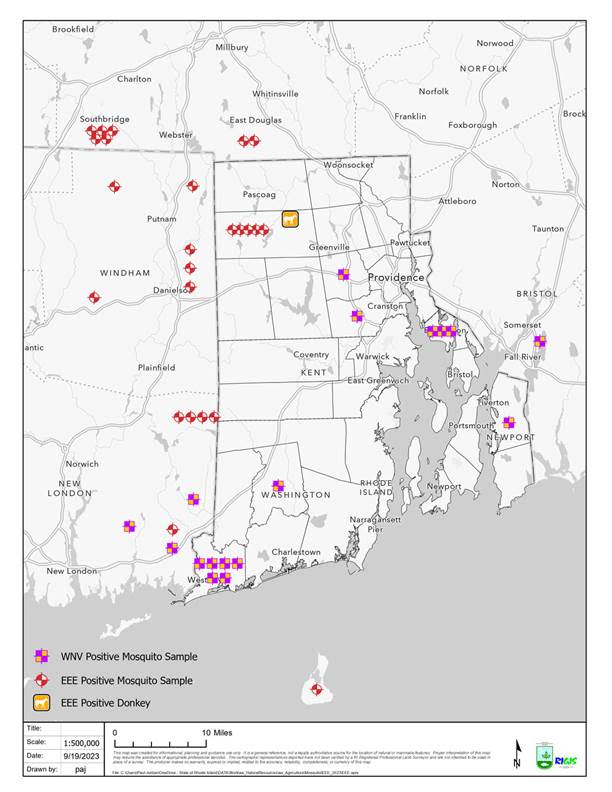More mosquito samples test positive for EEE, West Nile. Here's how to protect yourself.
PROVIDENCE – More mosquito samples taken from Westerly and Block Island have tested positive for West Nile virus and Eastern Equine Encephalitis, just one week after Department of Environmental Management announced that the risk level for these viruses is now considered high.
The Department of Environmental Management and Rhode Island Department of Health announced in a news release late Tuesday that one mosquito sample collected Sept. 12 from a trap set in the Boy Scout Camp Sandsland on Block Island has tested positive for EEE. Also, a mosquito sample also collected Sept. 12 from Westerly has tested positive for West Nile virus. RIDOH State Health Laboratories confirmed the findings after testing 147 mosquito samples collected from traps set statewide by DEM on Sept. 12. Testing on these samples at the Rhode Island State Health Laboratories is not yet complete.
Boy Scouts of America closed its camps in Glocester and Block Island for the remainder of the season after discussions with state health officials, according to the release. Last week, DEM announced that it has temporarily closed state-owned recreational areas in Glocester, including the George Washington State Campground, Durfee Hill and George Washington Management Areas, and Pulaski State Park until further notice to protect the health and safety of visitors and staff.

How many samples have tested positive so far?
To date, Rhode Island reports six positive EEE virus mosquito samples: five in Glocester and one on Block Island, one EEE case in a mammal (a donkey in Glocester that was announced Sept. 7), and 12 WNV findings: six in Westerly, two in Barrington, and one each in Cranston, Johnston, Richmond and Tiverton. The Commonwealth of Massachusetts reports 12 EEE virus findings in mosquitoes, 131 WNV findings, and three human cases of WNV. The State of Connecticut is reporting 19 EEE virus findings, 165 WNV findings, and two human WNV cases.
What should RI residents do now that the EEE and WNV risk is high?
With the state’s EEE virus and WNV risk levels now considered high, DEM and RIDOH are urging Rhode Islanders to continue protecting themselves and their loved ones from mosquito bites until the first hard frost of autumn. A hard frost, which is meteorologically defined as three straight hours below 32 degrees, kills adult mosquitoes. Its timing varies widely across Rhode Island. It often occurs in northern communities such as Burrillville in early October and in southern, ocean-facing communities later. Humans can only contract these diseases through a bite from an infected mosquito. RIDOH and DEM are issuing a heightened public health warning that it is a particularly active mosquito season and that both EEE virus and WNV are likely present in mosquitoes statewide.
'Unprecedented bat season': Rhode Island Health Dept. spreads safety message
What to know about EEE and WNV
Although extremely rare in humans, EEE is very serious and has a much higher human mortality rate than WNV. Approximately 30% of people with EEE die and many survivors have ongoing neurological problems, according to the release. Unlike WNV, which is prevalent in Rhode Island every year, EEE virus risk is variable, changing from year to year. For more information on EEE and ways to prevent it, please visit www.health.ri.gov/eee. WNV is the leading cause of mosquito-borne disease in the continental United States and is much more prevalent than EEE virus. Cases of WNV occur during mosquito season, which starts in the summer and continues through fall. There are no vaccines to prevent or medications to treat WNV in people. Fortunately, most people infected with WNV do not feel sick. About one in five people who are infected develop a fever and other symptoms. About one out of 150 infected people develop a serious, sometimes fatal, illness. For more information about WNV, visit www.health.ri.gov/wnv.
How to protect against EEE and WNV
The two state agencies are recommending that schools and communities consider “smart scheduling” — namely, that games, practices, and other outdoor activities scheduled to occur during early morning or dusk hours be rescheduled to earlier in the afternoon or relocated to an indoor venue.
Here are some other measures that Rhode Islanders should take to protect themselves from mosquito bites, and to help minimize mosquito breeding.
Put screens on windows and doors. Fix screens that are loose or have holes.
Consider rescheduling outdoor activities that occur during evening or early morning. If you must be outside, wear long-sleeved shirts and long pants and use bug spray.
Use EPA-approved bug spray with one of the following active ingredients: DEET (20-30% strength), picaridin, IR3535, and oil of lemon eucalyptus or paramenthane.
Do not use bug spray with DEET on infants under 2 months of age. The American Academy of Pediatrics recommends that repellents should contain no more than 30% DEET when used on children. Wash children’s’ hands with soap and water to remove any bug spray when they return indoors.
Put mosquito netting over playpens and baby carriages.
Remove items around your house and yard that collect water.
Clean your gutters and downspouts so that they can drain properly.
Remove any water from unused swimming pools, wading pools, boats, planters, trash and recycling bins, tires, and anything else that collects water, and cover them.
Remove or treat any shallow water that can accumulate on top of a pool cover. Larvicide treatments, such as Mosquito Dunks can be applied to kill immature mosquitoes. This environmentally friendly product is available at many hardware and garden stores and online.
Clean and change water in birdbaths at least once a week.
Visit health.ri.gov/mosquito for additional mosquito prevention tips, videos, and local data. For more information on DEM programs and initiatives, visit www.dem.ri.gov. Follow DEM on Facebook, Twitter (@RhodeIslandDEM), or Instagram (@rhodeisland.dem) for timely updates.
This article originally appeared on The Providence Journal: EEE, West Nile virus found in mosquitos from Block Island, Westerly
